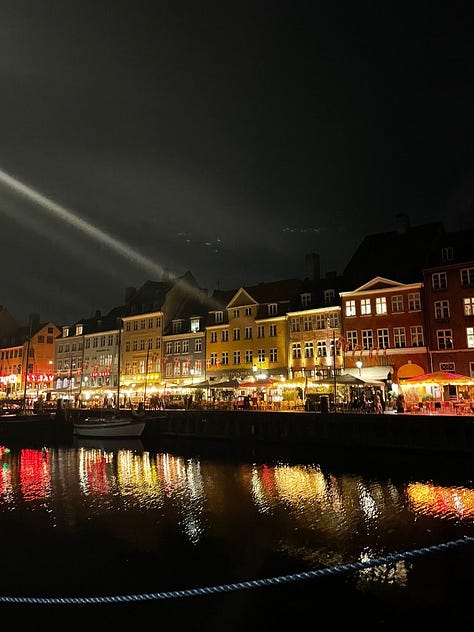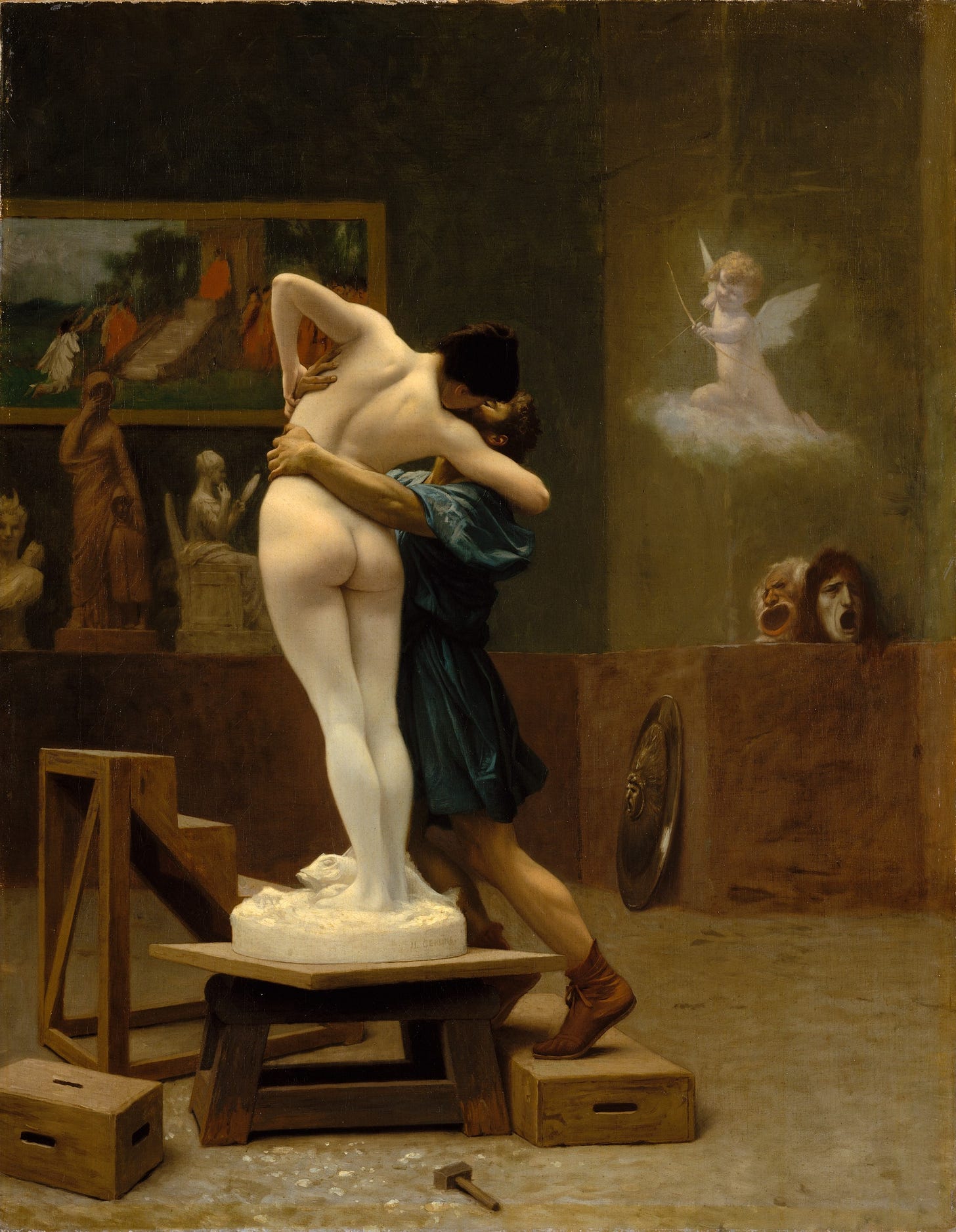HI. This letter is a day late because my thoughts were half-baked and I wanted to sit with them a little longer. I was inspired by the time my friend said something along the lines of, “I know she’s the worst, but I can’t help but like her—she’s just so beautiful.” We laughed, because it was funny, but also because it made sense. Her beauty made her more forgivable. Maybe it was us being shallow. Or maybe there was something else entirely…an undercurrent we couldn’t control. And knowing the spell had been cast did not lessen its effect.



One of my favorite myths as a kid was the story of the sculptor Pygmalion, who carves a statue so beautiful he falls in love with it. To reward his devoutness, Aphrodite breathes life into the ivory figure, creating a woman named Galatea. The Greeks believed that physical appearance was not superficial but informative of an object’s inner nature. Sight is a way of perceiving truth. The experience of beauty becomes spiritual—life creating. It transforms stone to flesh.
In On Beauty and Being Just, Elaine Scarry argues that “beauty brings copies of itself into being.” When we see something beautiful, we feel compelled to reduplicate it. This is why we take pictures at museums, listen to songs over and over, memorize poems, try to write like our favorite authors, paint landscapes. It is why Pygmalion replicated a woman’s beauty in marble, and why artists have been depicting his story for hundreds of years, again and again.
When we experience beauty, we experience pleasure from a world that we are not the center of. Scarry calls this radical decentering—it divorces egotism from pleasure. What if our insatiable appetite for beautiful things can actually turn us toward preservation, attentiveness, and sharing?
Beauty is fleeting, and we are desperate to capture it in words, paintings, and photographs. We freeze our skin cells and inject plastic with micro-needles and pull our faces back and staple them in place. Beauty is an eternal concept but its manifestations keep slipping out of our fingers.
“Our desire for beauty is likely to outlast its object because unlike all other pleasures, the pleasure we take in beauty is inexhaustible. No matter how long beautiful things endure, they cannot out-endure our longing for them.”
When a face ages or a song does not sound as good as it did when we were children, the fact that we experienced it at all might be enough. And the beauty will reduplicate, in another face, another song.
I often cannot look away from the most beautiful people in a room. I can feel myself treating them differently, with more deference, leniency, attention. I think my friends become more beautiful the more time I spend with them. I think I am more beautiful the more time I spend with myself.
I used to wish it were possible for me to blink and capture exactly what I was seeing. Cameras could not accurately capture magnitude nor color. But maybe it was my fault for trying to equate the vision and the photograph.
When my friends and I were deciding where we should go on fall break last year, we scoured online listings until we found a small cottage on a lake in Maine with its own wooden dock. The house stood on four stilts. We spent a day in the Acadia mountains, hoping to see the fall foliage. I was disappointed that we had come a few weeks too early—the trees were still mostly green.
Incorporating beautiful objects into my life makes it better. My insulated lunchbox is striped with pastels. My hair tie has a blue felt star on it. My hot pink water bottle is a joy to drink out of.
I have kept the same decor in my dorm room for three years. Freshman year, it made me feel less homesick. Sophomore year, it defined my side of the double bedroom. Junior year, in my first off campus apartment, it felt like the first room that was truly my own.
My friend Ananya tells me that my superpower is my “aesthetic sense.” I have always known which clothes I like best, what colors look good on me, how I want to take notes, plate my food, organize my stuff, etc. These choices feel so intuitive most of the time I can’t explain why I make them.
Is life just an accumulation of beautiful memories?
I can fall into the habit of being so concerned with beauty that I deprioritize my actual lived experience. For example. Sitting on a windowsill with a book and a cup of tea or picnicking in the park on a blanket with grapes and cheese and wine. Maybe the book is bad, and I check my phone for new messages every five minutes. Or I burn my tongue on the tea, and I drop my cup and it breaks and the ceramic shatters everywhere. Or maybe the park is too hot or too cold or too windy, and the conversation is awkward, and the grapes are sour, and the rosé is lukewarm.
Or, on the other end, what if the book is life-changing, or we sit on the blanket for hours and talk so freely that we forget that we haven’t known each other our whole lives. What if the sunset is so orange it turns our skin gold and sparkly. The pictures won’t capture that mystical quality either.
In both cases, only the images live on—the reduplication of the beauty. My questions are still the same: is it vain to love and pursue and collect beauty? Is it untruthful to share beautiful images of instances that were not entirely pleasurable? Is it insufficient to render magical moments with a camera? Maybe the tree splits in two—there is the beauty of the experience, and there is the beauty of how I decide to capture it.
I think there is something honest in accepting the shallow parts of beauty in order to access the part of it that transcends vanity. I have been awed by the enormity of mountains, the black vastness of the ocean at night, the synchrony of birds passing. I'll read a passage of a book over and over again, trying to understand how a series of words can evoke such lucid images and feelings for people who do not really exist. I've tasted food—mostly Korean soups and stews that my mother or grandmothers made for me—that has felt impossibly beautiful. And all this beauty leads to wonder, humility, joy.
What if beauty is not self-centered? What if the pursuit of a beautiful life is something that we can chase even when we are grey and wrinkled and all of our vanity has been drained?
Years ago, I went to MoMa and saw "Untitled" (Portrait of Ross in L.A.) by Felix Gonzalez-Torres. The artwork was a pile of candy in the corner of the gallery, and viewers were allowed to take one and eat it. The installation can take many forms in different spaces, but the candy is always supposed to start at 175 pounds (the weight of the average male) to represent Gonzalez-Torres’ partner who died of AIDS. The pieces are replenished as they are depleted. The human body splits and reforms, beautiful in its mutability, its resilience.







Wow!oh my word.🥺🤍
woooahhhh wow this is such a beautiful piece